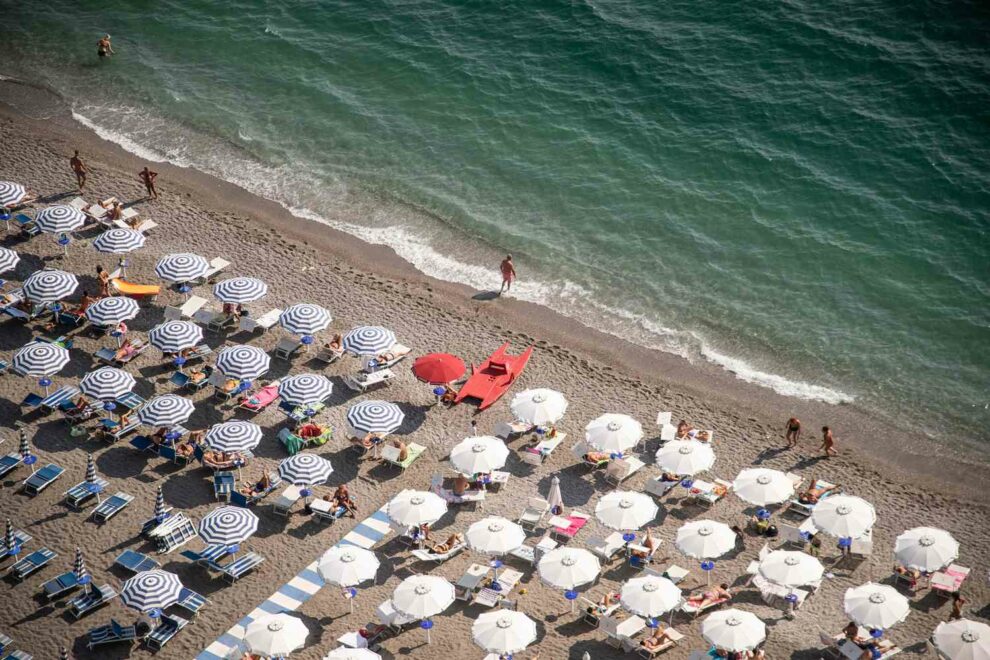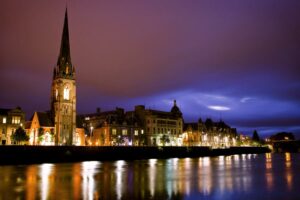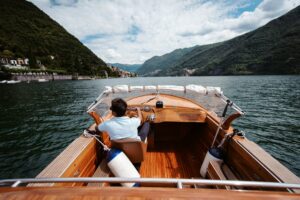Italians have mastered the art of the beach vacation. And it’s no wonder why — the country has more than 4,000 miles of coastline and more than 2,500 years of history. Italy’s Mediterranean climate is ideal for the umbrella pines, bougainvillea, and jasmine that bloom all summer long in the country’s loveliest beach towns. And during the sweltering summers, the sea provides a refreshing respite. Beach clubs up and down the coast rent lounge chairs and umbrellas for the day or the season. Most have facilities like bathrooms, showers, and changing rooms, as well as dining options ranging from no-frills beachfront shacks slinging sandwiches to elegant restaurants serving seaside classics like spaghetti with clams and fritto misto.
As an American living in Rome for nearly five years (and having visited for more than 10 years before that), I’ve made it my personal mission to scope out Italy’s best beach towns. On hot summer weekends, there’s nothing I enjoy more than escaping to the beach with a book and indulging in a lazy lunch by the sea. I’ve traveled up and down the coast and to many of the islands searching for the country’s best beach towns. These are some of my favorites.
Tropea
:max_bytes(150000):strip_icc():format(webp)/TAL-tropea-ITALYBEACHTOWNS0524-fcde6f78cc2e4f26a1af19d64c14c2e5.jpg)
Located in Calabria, the toe of the boot, Tropea is nicknamed the Pearl of the Tyrrhenian. Legend has it this town on the Coast of the Gods was founded by Hercules. Designated one of the Borghi Più Belli d’Italia (most beautiful towns in Italy), it has a charming historic center that’s perched on a cliff above the beach. You can join the beachgoers by day and then head up to the town in the evening, when it comes alive with people shopping, sipping Aperol spritzes at the bars on the main square, dining alfresco, and enjoying a gelato.
Noto
:max_bytes(150000):strip_icc():format(webp)/TAL-noto-ITALYBEACHTOWNS0524-c67cbec7d06a44f5b6ae29a93c1cd129.jpg)
One of Sicily’s most beautiful Baroque towns, Noto had a cameo in the second season of White Lotus. The town’s honey-colored historic center is about a 15-minute drive from the beach, which is lined with beach clubs featuring umbrellas in neat rows, including the swanky one run by Il San Corrado di Noto, a Relais & Châteaux resort in the countryside outside the town center. No visit to Noto would be complete without a granita at Caffè Sicilia, the famous cafe featured on Chef’s Table.
Carloforte
:max_bytes(150000):strip_icc():format(webp)/TAL-carloforte-ITALYBEACHTOWNS0524-5b0ea11bde274d0b8653dff7cfcf42b1.jpg)
The only town on the small Isola di San Pietro off the southwestern coast of Sardinia, Carloforte isn’t exactly easy to reach — but that’s what keeps it from getting overrun by crowds. Ligurian sailors settled here in the 1700s and brought a bit of the Italian Riviera to this little island by painting the town’s buildings pastel colors and introducing their recipe for pesto, which often appears on menus in the restaurants. The island’s beaches are mostly small coves where lounge chairs and umbrellas are haphazardly set up upon request and little beach shacks like La Tana on Spiaggia Punta Nera serve cold beer, Aperol spritzes, sandwiches, and ice cream.
Polignano a Mare
:max_bytes(150000):strip_icc():format(webp)/TAL-polignano-a-mare-ITALYBEACHTOWNS0524-e9942f72f55049ffa71778d9a162575c.jpg)
This whitewashed town on Puglia’s Adriatic coast has a picture-perfect bay surrounded by cliffs. You could spend hours wandering the town’s narrow streets lined with shops, restaurants, bars, and gelaterias. There’s something for everyone here, whether you want to splurge on a gourmet meal at the Instagram-famous Grotta Palazzese (the restaurant built into the cliffs) or try the creative seafood sandwiches at Pescaria. The secret is out, though, so if you go in the summer, expect crowds, especially at the tiny beach. A good way to escape them is to do a boat tour of the caves and grottos with Pugliamare.
Sperlonga
:max_bytes(150000):strip_icc():format(webp)/TAL-sperlonga-ITALYBEACHTOWNS0524-23058c7929dc4e9c86a57c7adca3e066.jpg)
About a 75-minute train ride south of Rome, Sperlonga is a seaside town on the Pontine Coast that has been a haven for Romans since the days of the emperor Tiberius. (You can still see the ruins of his villa.) This area — between Rome and Naples — is particularly beloved by Romans for its clean, sandy beaches, calm sea, and charming towns. With its whitewashed buildings, Sperlonga looks almost like a village in Puglia or the Greek islands. The historic part of town rises above the beach below, offering breathtaking views of the coast.
Gaeta
:max_bytes(150000):strip_icc():format(webp)/TAL-gaeta-ITALYBEACHTOWNS0524-08100beece83447fa9cc84000a81a286.jpg)
The next town over from Sperlonga is Gaeta, which is a bit larger. Gaeta’s historic center feels a bit raw and gritty, with weathered buildings where you might see laundry hanging and potted plants decorating the entrance of homes. The beaches unfurl below the town, with golden sand and aquamarine water. Beach clubs like the no-frills Bagno Arenauta have neat rows of lounge chairs and umbrellas and serve local dishes like tiella, a savory pie filled with octopus and tomato, zucchini, or other vegetables.
Forte dei Marmi
:max_bytes(150000):strip_icc():format(webp)/TAL-forte-dei-marmi-ITALYBEACHTOWNS0524-6f41702b4df341d587e738d3f9400713.jpg)
Tuscany’s most upscale beach town, Forte dei Marmi doesn’t strike you with its overwhelming beauty like Capri, but it has long been a haven for quiet luxury. This is the kind of place where the sidewalks are paved in marble. Prada, Dolce & Gabbana, and Armani all have shops on the streets off the main square, and at the big outdoor market, which takes place on Wednesday and Sunday mornings, you can buy cashmere sweaters and bejeweled dog collars. The long stretch of sand is lined with beach clubs where cabanas provide shade and beachgoers polish off plates of spaghetti con le arselle (tiny clams native to this part of Italy) and fritto misto with local vermentino wine.
Amalfi
:max_bytes(150000):strip_icc():format(webp)/TAL-amalfi-ITALYBEACHTOWNS0524-b5eae631ddd04400b3bc19f43108a7c9.jpg)
Positano may be the most emblematic town on the famed Amalfi Coast, but there’s a larger beach in Amalfi. Once a powerful maritime republic, Amalfi is still a hub for visitors, who often arrive at the marina on ferries from Naples, Sorrento, or elsewhere on the coast. Everything centers around Piazza Duomo, where the town’s imposing Gothic cathedral looms over the shops and cafes. To escape the crowds, choose a hotel above the town, like Hotel Santa Caterina (a family-run member of Leading Hotels of the World and a World’s Best Awards winner) or Anantara Convento di Amalfi, featured on T+L’s 2024 It List.
San Vito Lo Capo
:max_bytes(150000):strip_icc():format(webp)/TAL-san-vito-lo-capo-ITALYBEACHTOWNS0524-214ec16c94a64c89ad9e567d47de526d.jpg)
All the way up in the northwestern corner of Sicily, this popular beach town bears a striking resemblance to Rio de Janeiro, thanks to the tall, green mountain that looms over the wide, sandy beach. Don’t expect to find luxury resorts here, but rather simple beachfront hotels that sometimes have their own beach club. What you’ll find instead is fantastic food, including regional recipes like pesto alla trapanese (a Sicilian pesto made with tomatoes, almonds, garlic, and basil) and couscous with seafood. San Vito Lo Capo is the gateway to the Zingaro Nature Reserve, where you can join boating excursions that let you swim and snorkel in the sparkling turquoise sea.
La Maddalena
:max_bytes(150000):strip_icc():format(webp)/TAL-la-maddalena-ITALYBEACHTOWNS0524-c909993a72cb47fab9f160d9591182f1.jpg)
La Maddalena is the largest island in the eponymous archipelago just off Sardinia’s swanky Costa Smeralda. The island is part of Sardinia’s first national park, so the whole archipelago is a natural paradise protected from further development. Giuseppe Garibaldi (a key figure in Italy’s unification movement in the 1860s) lived on the nearby island of Caprera and there’s a statue of him in La Maddalena. In the island’s eponymous town, you’ll find plenty of restaurants, shops, cafes, and bars. It’s often a stop on boat tours that depart from Costa Smeralda or Palau.
Camogli
:max_bytes(150000):strip_icc():format(webp)/TAL-camogli-ITALYBEACHTOWNS0524-37241d0dacd6489ab874bbfbfd171284.jpg)
The most famous town on the Italian Riviera may be Portofino, but Portofino has a harbor, not a beach. Located about a 30-minute drive away, picturesque Camogli has a large, crescent-shaped pebble beach with a church at the tip. Along the waterfront are shops, bars, and restaurants like the historic La Camogliese, which has been serving fresh seafood since 1912. From here, you can catch a boat to San Fruttuoso, where an abbey stands right on a small but beautiful bay.
Forio
:max_bytes(150000):strip_icc():format(webp)/TAL-forio-ITALYBEACHTOWNS0524-c09ab34c46394dcea6ca96df9731a2f1.jpg)
The largest town on the island of Ischia, Forio was featured in Elena Ferrante’s
“Neapolitan Novels” and parts of it still look like it would have back in the 1960s, when the books take place. Ischia has been drawing travelers since the ancient Greeks first arrived on its shores and bathed in the natural thermal hot springs. There are some beaches on the island where people actually boil eggs in the hot springs.
San Vito Chietino
:max_bytes(150000):strip_icc():format(webp)/TAL-san-vito-chietino-ITALYBEACHTOWNS0524-f380400b225a420a906242d509bcaf3d.jpg)
In the rugged region of Abruzzo, on Italy’s Adriatic side, the Trabocchi Coast is known for rustic wooden fishing huts called trabocchi, which hover above the sea on stilts. Many of them have been converted into restaurants serving fresh seafood. One of the towns on the Trabocchi Coast, San Vito Chietino has a long bike path overlooking the sea and pebble beaches where people relax in the summer. Locals love to go to Al Murè for sunset cocktails and international street food-inspired bites before having a gelato at Pasticceria Rossana Iezzi.
Santa Severa
:max_bytes(150000):strip_icc():format(webp)/TAL-santa-severa-ITALYBEACHTOWNS0524-223edd584a954b46b7ecb01dedd2b02f.jpg)
About an hour and 20 minutes north of Rome lies the little town of Santa Severa, where Romans go to sunbathe on the beach in the shadow of a 14th-century castle. There’s a large section of free beach right next to the castle, where anyone can plop a towel down on the sand. Otherwise, you can rent a lounge chair and umbrella from one of the beach clubs, like L’isola del Pescatore, which also has a charming restaurant with blue-and-white painted wooden tables and chairs. Just be sure to make a reservation if you want to dine there, especially on summer weekends.
Vietri sul Mare
:max_bytes(150000):strip_icc():format(webp)/TAL-vietri-sul-mare-ITALYBEACHTOWNS0524-454385ca83904c9a9448c55fb327e7ee.jpg)
The last town on the Amalfi Coast, Vietri sul Mare doesn’t draw the tourist crowds of Positano and Amalfi, but it actually has larger beaches. Vietri is also known for its production of hand-painted ceramics, which decorate the public benches and fountains around town. The largest ceramic-producing workshop is Solimene, but there are dozens of smaller workshops and stores selling beautiful plates, bowls, and all kinds of decorative items.









